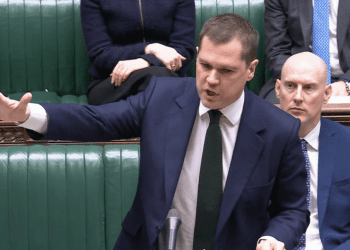Delivering the Robin Cook memorial lecture was one of the greatest privileges of my time in Parliament. But it wasn’t just a privilege – it was a burden too. The name Robin Cook still carries a weight that few in politics today can match. To honour it properly meant going beyond platitudes, to wrestle with the substance of his life and what it demands of us now.
And something happened along the way. By the end of writing the lecture, I admired him more than when I began. Not because he was flawless – he wasn’t – but because his flaws never stopped him from showing courage when it mattered most. Cook’s example proves that greatness and fallibility can coexist, and that integrity in politics is always a choice. In an age when politics is too often reduced to managerial calculation or performative outrage, that is a lesson we desperately need to relearn.
Cook’s career was a lesson in balance. He existed at the fulcrum of politics: that precarious point between pragmatism and principle where the only serious politics is done.
It is the point Labour has rarely managed to hold. Too often the party has lurched between purity politics, too rigid to govern, and managerial politics, too hollow to inspire. Cook refused both dead ends. He adapted when reality demanded it, but he refused to surrender the values that anchored him.
That balance gave meaning to his eventual resignation over Iraq. It wasn’t a rash act of conscience from someone unused to power. It was the culmination of a career spent holding the line between pragmatism and principle – and recognising when the line had been crossed.
Cook also understood that politics was not a factional game of winners and losers. He was trusted across the Labour spectrum because he did not treat disagreement as betrayal. He brokered alliances between Tribune and the Campaign Group not because he agreed with everything either said, but because he believed every part of Labour had something vital to contribute.
That tolerance feels like another era. Today dissent is pathologised, selections are stitched up, members treated as irritants. Labour’s pluralism, once its superpower, has been replaced by a culture of control.
Cook once compared party management to the reins of a horse. The reins, he said, are there to balance the animal before the jump, to channel its energy and make sure it clears the obstacle. They are not there to yank the horse’s head down, stifle its movement, or stop it running at all. Cook’s metaphor captured something essential: that leadership is about harnessing enthusiasm, not strangling it. Today, the reins are pulled so tight the horse can barely move.
But metaphor’s aside, Cook’s politics were rooted not in abstraction but in a fierce sense of who was being left behind. In private he worried Labour’s modernisation programme alienated the bottom 20%. This meant they were at risk of being abandoned by the mainstream and absorbed into the ranks of fascism. He saw what happens when markets tear free of social bonds, when people are treated as disposable. Long before today’s populist surges, Cook feared that if Labour failed the poorest, others would claim them with a politics of resentment and exclusion.
Look around now and his fears feel prophetic. As disinformation swirls, as alienation hardens into rage, the far right offers belonging to those left adrift. Cook’s warning wasn’t just analysis. It was a glimpse of our present.
Cook also knew that Labour’s task was not just to govern but to reform the system itself. Watching Margaret Thatcher declare that proportional representation would mean “no more Conservative governments ever” was, for him, an epiphany. He embraced PR not as a tactical gimmick but as a moral necessity.
Cook saw that a political culture open to representation and debate would be stronger, not weaker. That discussion and disagreement make politics healthier. And he warned that unless Labour changed the voting system, it would one day find itself back in opposition on a minority vote. He was right.
Above all, Cook understood integrity as the lifeblood of democracy. His resignation in 2003 exposed what I call the “integrity gap”: the gulf between what governments say and what the public believe. That gap was not born with Blair, but it widened dramatically under him.
The trap had been set by Thatcher and Major, as public service was hollowed out and politics became increasingly managerial. But it was Blair’s false prospectus for war that blew it open. Trust in politics never recovered.
And what filled the void? A political culture where proximity to wealth became the measure of success. Where public service was no longer an end in itself, but a stepping stone to corporate consultancy or a boardroom seat. Peter Mandelson’s appointment as US ambassador was not an aberration; it was the logical consequence of this political culture.
Joseph Conrad’s Heart of Darkness is another useful metaphor here. Some shed their early idealism and, like Conrad’s Kurtz, could not return. In its place grew something colder: a political class comfortable with corporate capture, for whom public service was no longer its own reward.
And here is the danger. The Labour leadership is now confronted by a world of disinformation, by an authoritarian right well versed in wielding it. Yet the political culture Labour has embraced – intolerant of dissent, dismissive of members and the public, cosy with corporate power – leaves it unable to respond with authenticity.
Integrity is the basis of authenticity. And authenticity is the precondition of trust. Without trust, no appeal to resist authoritarianism will land. That is why, when the prime minister warns of the dangers of the far right, many will simply hear hollow words. How can he convincingly call out authoritarianism abroad while presiding over its habits at home? How can he rally people against billionaire-backed demagogues while inviting Oracle, BlackRock and corporate lobbyists into the heart of government?
This is the real danger of the integrity gap. At the very moment we most need politics capable of calling out the authoritarian right, our political class shares too many of its instincts: disdain for pluralism, impatience with democracy, comfort with corporate power. In trying to resist authoritarianism, it risks echoing it.
But Cook’s life shows us another way. He showed that politics could still mean something. That integrity was not ornamental but essential. That pluralism was not weakness but strength. That public service, done for its own sake, was the highest calling.
If Labour is to meet this moment, it must rediscover the fulcrum where Cook lived: the balance between pragmatism and principle, power and integrity, pluralism and purpose. Because unless we close the integrity gap, unless we rebuild a political culture that is open, tolerant and honest, we will remain incapable of confronting the forces now rising against democracy.
Cook once showed that courage is contagious. The question is whether we have the courage to follow him.
This article based on a speech given by Clive Lewis MP at the Robin Cook Memorial Lecture, Sept 2025
Politics.co.uk is the UK’s leading digital-only political website. Subscribe to our daily newsletter for all the latest news and analysis.
The post Clive Lewis: ‘Robin Cook showed us politics at its most serious. Labour has lost that balance’ appeared first on Politics.co.uk.

































